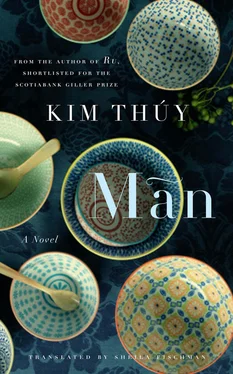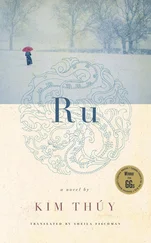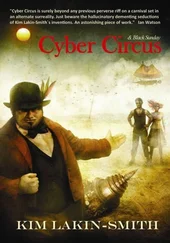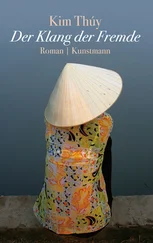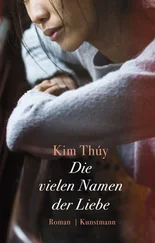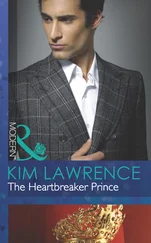more than the time
you fell asleep in my arms
in a trust so gentle,
I let the darkening room
drink up the evening, till
rest, or the new rain
lightly roused you awake.
I asked if you heard the rain in your dream,
and half-dreaming still you only said, I love you.
da

skin
LUC FELL ASLEEP BESIDE ME even though he’d never before given himself over to sleep in a lover’s arms. As for me, I had learned how to fall asleep very quickly, on command, so that my eyelids would serve as curtains over landscapes or scenes from which I preferred to be absent. I was able to move from consciousness to unconsciousness with a snap of the fingers, between two sentences, or before the remark that would offend me was spoken. Oddly enough, during that day stolen from time, I couldn’t sleep. I engraved in my memory every fragment of Luc’s skin. I counted each of the folds in his body, including those in his neck, in the cubital fossa, that reverse of the elbow, and the popliteal cavity, the H just behind the knees — all the grooves where dirt lodged when I was a child.
Mothers had to scrub those spots that imprisoned dust carried by the wind and caught unintentionally by children. Observing the lines of Luc’s body, I realized that I’d never had a chance to run my fingers over my children’s folds because they never came home with collars of dirt, as I did after a day of school. The Montreal air must have been filtered, purified — or was it simply too pure to leave traces? The whiteness of Luc’s skin bore that purity, even though the scar above his eye told of his closeness with his dog and the one on his ankle, of his reckless youth, a mark that still made him jump at the slightest touch.
thẹo

scar
THE PAINLESS SCAR on my thigh showed skin burned by the hot water in a Thermos bottle spilled, accidentally most likely, by a child who was afraid of having to share the powdered milk I was stirring up in a glass for her. Maman had never seen that burn, only the scar when she returned from far-off places, whose names could not be spoken of.
I hadn’t seen her wound either, only the hole from the bullet that had pierced her right calf. She’d reassured me, saying it had been an accident. I had reassured her in turn, saying it was my own awkwardness. We never had to talk about those scars again, because Maman didn’t wear skirts and I didn’t wear minis. My husband assumed it was a birthmark, and my children saw no anomaly because I didn’t parade around the pool in a swimsuit, never stretched out on the beach to melt in the sun. Only Luc had observed that slight discoloration of my skin long enough to make out a map of the world there and to draw the road he would walk along towards me. Meanwhile, he had to attend a parents’ meeting with his wife, at the children’s school, far from me.
ngủ

sleeping
I LISTENED FOR HIS FOOTFALL on the first steps before I ran to the balcony. He came back into the bedroom and found me leaning over the banister, on tiptoe, waiting for his silhouette to appear on the sidewalk. I went down to his car with him so that he would leave, so that he would continue to be a good father. I reminded him that he wasn’t abandoning me, that the bed still held the shape of his back and the pillow, that of his arm which had reached for me after the brief moment when he’d nodded off. I was sitting a breath away from him, just far enough to watch over his sleep without disturbing him.
I had learned to glide silently both inside and outside the covers because my husband was a very light sleeper. Early in our first months together, he had asked me to sew for him a long, round cushion like the one he used to wrap his arms and legs around when he was a child. Only that human-size cushion could soothe him and keep him from dreaming about his grandfather who often, in the middle of the night, gathered together in the ancestors’ hall the grandchildren and children who lived on the family property so that all would kneel before him and listen to him scolding his wife. The grandfather imposed his authority on the house just as he did on the military base. He demanded absolute obedience so he could go on giving orders that would rip open the sky and tear apart destinies in the hundreds without blinking, without collapsing. My husband slept with frayed nerves. A single clumsy movement on my part and he would waken with a start, frightened eyes staring at me, surprised I was there. Luc had had the same terrified expression when he’d felt, unconsciously, not my presence but my absence.
xèo

pschiii!
ON THE NIGHTS WHEN WE offered the Vietnamese menu, Luc set up three islands in the restaurant. The first held huge platters of woven water hyacinth filled with fresh herbs for preparing spring rolls, and green papaya salad with dried beef marinated in rice wine, wrapped in sesame seeds and grilled at a very low temperature for ten hours. Two young Vietnamese girls in silk smocks slit to the waist on both sides handled the rolls with the slowness of hot countries and the confidence of young girls in bloom.
Luc had decorated the second island with four yoke baskets containing bowls, rice noodles and two big cauldrons of broth, including one typical of Hue, the former imperial capital that took pride in the refinement of its cuisine, conceived and developed for emperors and dignitaries.
The third was reserved for me, for turning crepes with turmeric, pork and shrimp, a process that required a flexible wrist and quick movements so the batter would cover both the bottom and the walls of the pan, in a thin layer. Since the name of the dish— bánh xèo —evokes the sound of the liquid crackling in contact with the heat, the temperature had to be high but controlled to prevent it from boiling. The challenge was to stuff the crepe with bean sprouts and yellow beans and fold it in two without breaking it. It always pained me to break the first finished crepe, but I had no trouble with the one offered to Luc. I wanted him to taste the pleasure of feeling the crepe give way and crack between his lips. I could feel the fine crust melting in his mouth and disappearing instantly, as fast as the beating of wings. And I hurried to wrap the second mouthful with a leaf of white mustard so it would leave a hint of bitterness and freshness on his tongue.
gương

mirror
DURING SERVICE, I WOULD see him going from table to table trying to persuade diners to use their hands for the crepes, which were at once majestic and so fragile. Even if the place was packed, looking up from the three crackling woks for even half a second would inevitably make me lock eyes with Luc, who would be opening a bottle of wine at a distant table or greeting a faithful customer at the entrance. I recognized myself in those eyes as I’d have recognized myself in the mirror on our bedroom wall, where we had stopped time. I had only a few mirrors in my house in Montreal, one too high, one too hidden away, and a tiny one my husband had hung at the front door to drive away evil spirits. Like them, who are terrified by their own reflection, I jumped whenever I saw mine because it didn’t correspond with the image I had of myself. Yet next to Luc’s face, mine resembled me, like something obvious. If I were a photo, Luc would be the developer and the fixer of my face, which until that day existed only in negative.
Читать дальше
